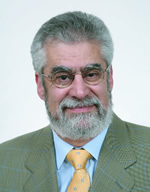About the 3rd Awardee
The winner of the 3rd Terumo Global Science Prize is Prof. Michael V. Sefton, University Professor and Michael E. Charles Professor in the Department of Chemical Engineering and Applied Chemistry and the Institute of Biomaterials and Biomedical Engineering, University of Toronto. His career and achievements are described below.

Prof. Michael V. Sefton
Career
- 1971
- University of Toronto - B.A.Sc. in Chemical Engineering and Applied Chemistry
- 1974
- Massachusetts Institute of Technology, Department of Chemical Engineering - Sc.D., supervised by E.W. Merrill
- 1974 - 1979
- Assistant Professor, Department of Chemical Engineering and Applied Chemistry, University of Toronto
- 1979 - 1985
- Associate Professor, Department of Chemical Engineering and Applied Chemistry, University of Toronto
- 1985 - 1989
- Associate Chairman, Department of Chemical Engineering and Applied Chemistry, University of Toronto
- 1985 -
- Professor, Department of Chemical Engineering and Applied Chemistry, University of Toronto
- January - July 1994
- Acting Chair, Department of Chemical Engineering and Applied Chemistry, University of Toronto
- February - August 1995
- Acting Director, Institute of Biomedical Engineering,University of Toronto
- 1999 – 2005
- Director, Institute of Biomaterials and Biomedical Engineering, University of Toronto
- 2003
- University Professor,Department of Chemical Engineering and Applied Chemistry and Institute of Biomaterials and Biomedical Engineering,University of Toronto
- 2004
- Michael E. Charles Professor,Department of Chemical Engineering and Applied Chemistry,University of Toronto
Prof. Michael V. Sefton is regarded as a pioneer in tissue engineering and a leader in biomaterials, biomedical engineering and regenerative medicine. He was the first to recognize the importance of combining living cells with synthetic polymers to create "artificial" organs and tissues. He was also one of the first in the world that succeeded in micro-encapsulating live cells – with a view to creating an artificial pancreas and other tissues that could then evade the patient's immune system through the barrier properties of the encapsulating membrane. Prof. Sefton has published extensively in the world's leading journals and international conference proceedings, and is the holder of several U.S. and international patents. In 2014, Prof.Sefton received the Gold Medal, Canadian Council of Professional Engineers, and was nominated as an international member of the National Academy of Medicine.
Achievements and the Reasons for Prize Winning
Professor Michael V. Sefton of University of Toronto is a researcher who demonstrated the importance, ahead of anyone around the world, of constructing "hybrid" type organs, or tissues that combine living cells and synthesized macromolecules, the most important subject in regenerative medicine today. He succeeded in microencapsulating beta cells, which produce insulin in the pancreas, and sustaining them for the first time globally. Through microencapsulation, the pancreas beta cells can avoid attacks from the immune system of the living body and maintain their functions within the living body. Such microencapsulation of the cells was the catalyst that eventually led to the realization of regeneration of cardiac muscle tissues and adipose tissues in combination with biomaterials. This facilitated the progress in the fusion areas of biomaterials and regenerative medicine, which is what the Terumo Global Science Prize intends to recognize. In this regard, the achievement of Professor Sefton made ahead of the times is worthy of special mention.
Furthermore, Professor Sefton discovered that it is possible to control the development of the blood vessel networks constructed around the biomaterials implanted in a living body by accurately controlling the composition of the materials. Based on these results, venture companies have been established, and are already realizing products for practical application mainly in the wound healing field.
Professor Sefton also designed a series of bioactive polymers, or macromolecules called Theramer, as he encountered the idea of adding bioactive functions to the structures of biomaterials. Before this, biomaterials had been believed to have only supportive functions. Clinical development is already under way with Theramer in the field of wound healing. As such, Professor Sefton has achieved superb results in the scientific and technological arena, as well as in taking initiatives to practically apply the results. We believe that his endeavors are a perfect match with what the Terumo Global Science Prize pursues to honor and encourage.
On top of these, Professor Sefton established an organization entitled Living Implants From Engineering (LIFE) Initiative, during the 1990s as a collective of many researchers working actively on a global scale in the regenerative medicine field. The LIFE Initiative created a road map for regenerative medicine that would eventually lead to regeneration of the heart in its entirety, showing the path along which the field of regenerative medicine focusing on biomaterials should proceed. As such, the organization built the foundation on which the field of regenerative medicine has developed and evolved to flourish today, and we express our deepest respect for its undertaking.
We selected Professor Sefton as the winner of the 3rd Terumo Global Science Prize of the TERUMO LIFE SCIENCE FOUNDATION, as we believe that his achievements described above are most befitting and worthy of the prize.

